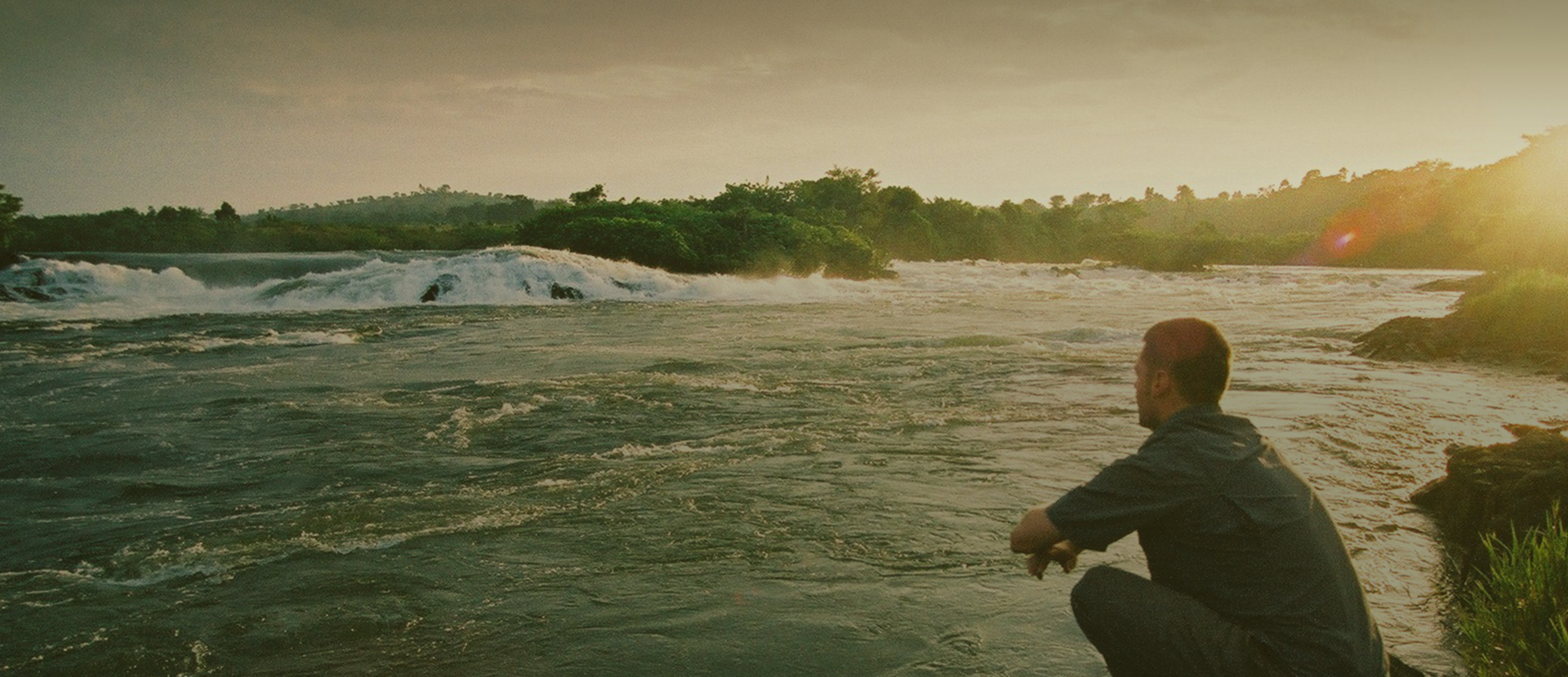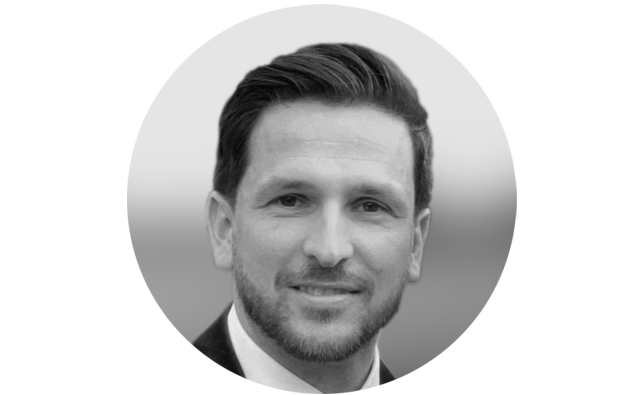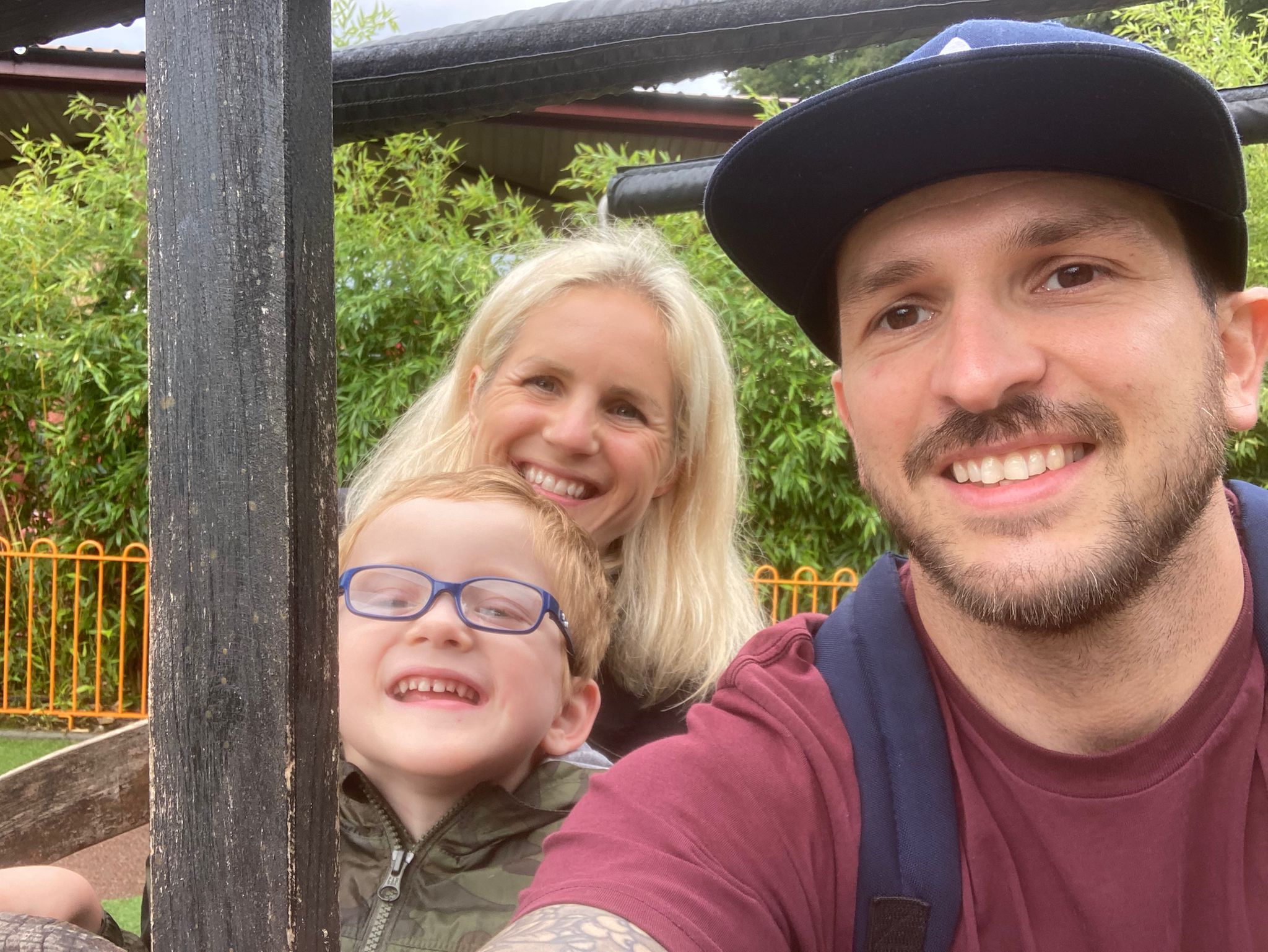 I'm a pretty typical mid-40s guy, living on the south coast in Bournemouth, working in recruitment. I live there with my beautiful wife, Sam, and my son, Chester, or Chezzy, as I call him. Chezzy turned six in March; he was born on St Patrick's Day, and is our first and, currently, only child. He has quadriplegic cerebral palsy, which was diagnosed when he was about two months old. It affects him in all four limbs, so Chester is a non-walker, and he's a full-time wheelchair user. Well, I say full-time, but he crawls around the house and burns out holes in his trousers most of the time. He's also delayed somewhat mentally, and has various other kinds of learning challenges.
I'm a pretty typical mid-40s guy, living on the south coast in Bournemouth, working in recruitment. I live there with my beautiful wife, Sam, and my son, Chester, or Chezzy, as I call him. Chezzy turned six in March; he was born on St Patrick's Day, and is our first and, currently, only child. He has quadriplegic cerebral palsy, which was diagnosed when he was about two months old. It affects him in all four limbs, so Chester is a non-walker, and he's a full-time wheelchair user. Well, I say full-time, but he crawls around the house and burns out holes in his trousers most of the time. He's also delayed somewhat mentally, and has various other kinds of learning challenges.
The pregnancy came out of the blue; I remember getting a call from Sam to say, ‘you might want to sit down, I've got some news’. Roll forward seven months, when Sam was 30 weeks’ pregnant and, just after I’d finished playing football with work, I got a call from Sam to say she was going into labour and I needed to come home. I was about 45-minutes’ drive away, so I quickly jumped in the car. There were no bags packed, no names decided, no anything at that stage. The pregnancy up to that point had all been very standard. Every scan had been positive and we were classed as low risk. Sam had been to all the appointments, was taking every supplement under the sun, and reading every book she could find about what to do as an expectant mother. We tried to follow everything to the letter and to this day we don't know why he was delivered early.
I remember it being quite a traumatic birth, mainly because it was completely unexpected. But, as anyone with a premature baby would know, it's almost surreal in the sense that as soon as the child's born, they put them in the equivalent of a plastic bag, whisk them away and you don't even get to see them. The first time we saw Chester was a few hours later, when we were looking at him in the intensive care unit (NICU) with different cables and breathing apparatus on him. He was tiny; I think he was two pounds when he was born. At that stage, I guess your mind goes to dark places, thinking ‘is he going to survive?’ He was in hospital in the NICU for 50 days. That was a really tough time. Clearly, you want to be there all the time, but there’s a point where you need to go back to work, while also supporting your family, and so you've got to rely on your support network. The way we managed that was, for the first couple of weeks, Sam and I were in there pretty much every hour you could be there, both returning home in the evenings. Then when I went back to work, Sam would be by his side every single day and I would go there after work in the evenings, and friends and family brought us food.
Looking back at that time, I did still believed that everything was going to be okay. I thought, ‘well, it's a tough 50 days but actually this will be a distant memory soon’. All the brain scans looked absolutely normal, but when we were getting ready to move from intensive care into the normal maternity unit, they did another brain scan and found there was actually some damage to the white matter in his brain. This came completely out of the blue because it hadn’t shown up on his previous scans. Sam was with Chester at the hospital when they told her this, so she called me when I was travelling back from work in London to tell me the news. She was in floods of tears and could barely speak, but she told me the consultant thought there was a high possibility that Chester could end up with cerebral palsy. I then spent the next hour on a train, deep in my thoughts about what had happened and also really wanting to get back to comfort Sam. Still in the back of my mind I was thinking ‘this happens to other people; it doesn't happen to us’. I rushed to the hospital and Sam’s still in floods of tears. Consultants come in to talk to us, but at this stage they say cerebral palsy is still only a chance, so you're holding onto that hope.
We took Chester out after 50 days. He came home and we were still expecting everything to develop normally, but we soon realised that, actually, he was different to other neurotypical children. He wasn't able to put his arms up in front of him, and there were a few other telltale signs. So, we had meeting after meeting and appointment after appointment with different consultants, and after about two months, he had his diagnosis, which was really early.
I was watching the video of the first time we held Chester yesterday. Chezzy loves playing on iPads and looking at photos, and he looked at this video and he's like, ‘oh, that was me’ and he wanted to know why there were tubes attached to him. When we first held him, the nurse very carefully took him out of the incubator and gave him to Sam to hold. He was only one day old, and so he was allowed out for the shortest time ever, still attached to the machine. At that time, anytime you touched him, you'd have to make sure you washed your hands and you'd only be allowed to touch him inside the incubator. Watching the video of Sam’s first time holding Chester, he sounded like a little sheep; because he was so small, his cry was almost like bleating. My first time holding him was very surreal. He was just tiny, absolutely tiny. As a first-time dad, I'm thinking ‘I don't even know how to hold him anyway, let alone when he's this small’ and that was difficult.
We stayed over at the hospital for the first few nights after the birth but I almost had to force Sam to go home and get some rest. She was wracked with guilt every time she left Chester. I think I’m naturally a bit more pragmatic in the sense that I knew it's what we needed. I knew he was in safe hands and that we couldn't affect anything by being there. At times his SATs would drop and the alarms would go off – sometimes the staff would come over and just tap the button to turn the alarm off, and you're wondering whether or not you need to be worried. Obviously, you just have to trust that they know what they're doing. My role was to help Sam understand that she shouldn't feel guilty. She's not letting Chester down by leaving his side, actually she's doing it to be a better mother for him. We got into a routine pretty early on, and every day there were slight improvements in different respects.
My employers at the time were absolutely fantastic. The type of role I do gives me the option of being home-based if I need to be and I've got that degree of flexibility with my workload. My office was based in Winchester, which was about an hour journey to Poole each way, so I had to factor that in to make sure I was there for Sam when she needed me. Maybe naively, because I was optimistic about Chester’s outcome, I was thinking, ‘everyone who’s had a child has a similar bedding in period, it's just that ours happens to be in hospital instead of at home’.
I always try to be pragmatic, optimistic and put things into perspective. I know sometimes it doesn't help to say, ‘well, it could be much worse’, or compare yourself to other people, but that actually helps me in a way. It helps me realise that, firstly, it could be much worse, other people have gone through it survived it before, and there are support networks out there. You see people thriving in certain situations, so why should I be any different? I'm not one to be a victim and I don’t want to let things eat me up, so I'm always thinking ‘what can I do to change this for me’ or ‘how do I get around this?’ Obviously, I've had some pretty dark days too, as has my wife, but generally speaking, nothing really fazes me or stresses me out. Some days, I'll wake up and I'll feel tired and have no energy or motivation, and I'm thinking, ‘is that a physical thing or a mental thing?’ I don't know how quickly other people can identify being anxious or depressed, but I'm not sure I necessarily know how to identify that. To me, it's about pulling myself through it and getting on with stuff. If I sit there and don't do anything, I’ll only feel worse. And I know that's not right for everyone, but that's my way of coping with it. I've just got to plough on and think about something else.
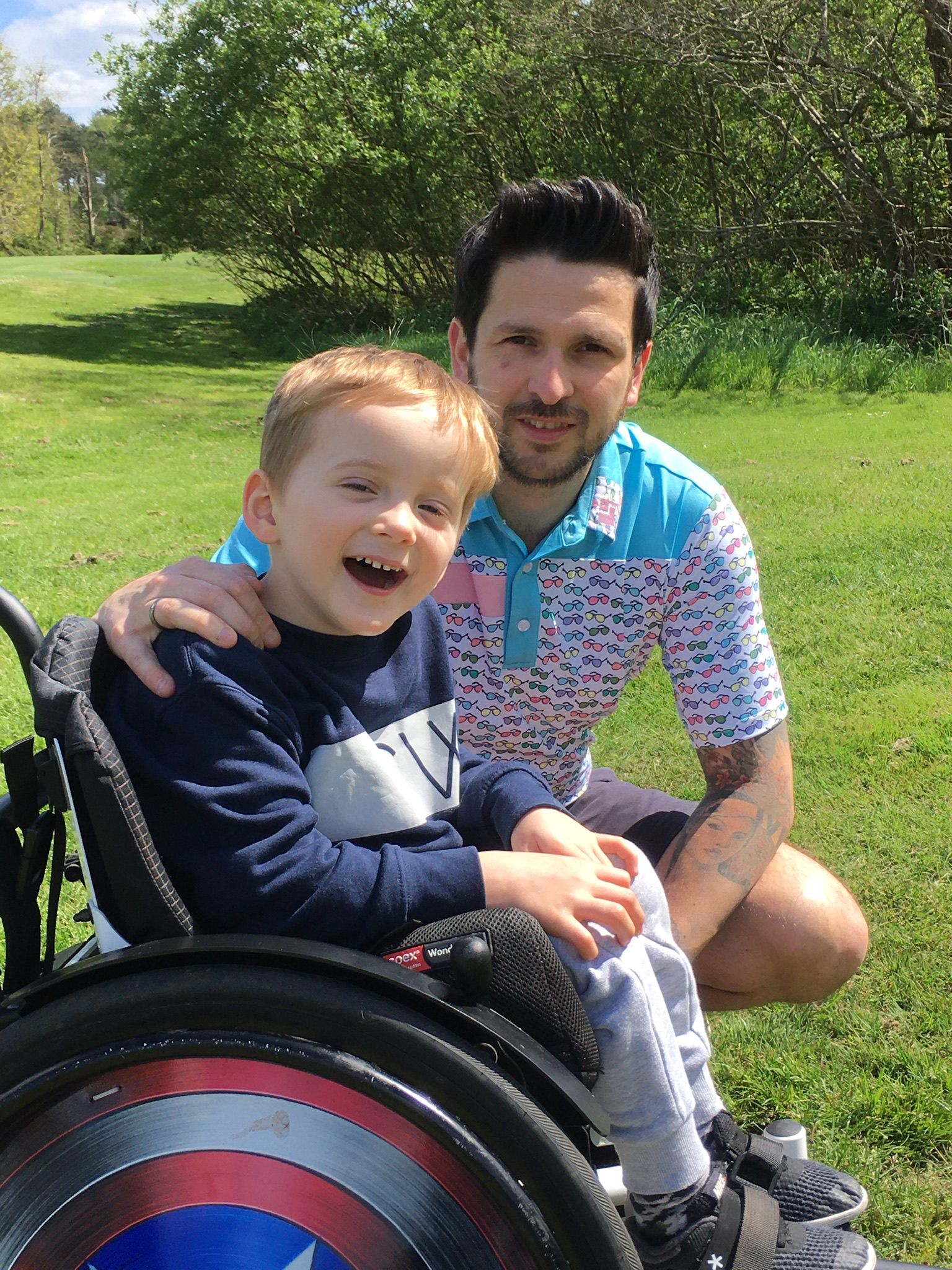 I wouldn't say I necessarily had challenges with my mental health when Chester was under three because, while he faces different challenges to other children, at that stage his differences weren’t as obvious because he was still a baby. It's only now he's getting older, I'm starting to really notice the core differences between him and other children, and the activities, relationships and fun that all the other parents are able to have with their children. That starts to make you feel really down, and then sometimes I'll be really short with Chester and shout at him when I know I shouldn't. It's just a constant battle to get him to enjoy things. I know that if I go somewhere and it's soft play or a trampoline I'm going to have to physically get on there with him and jump up and down for half-an-hour. And I just feel like I haven't got the energy to do what I need to for him. Then I see my friends, and their kids are playing football, and I think Chester would love to do that, but he has to sit on the sidelines and watch in his wheelchair. I want Chester to have friendships, and he does to a degree, but when you see him interact with other children, and then they just run off and leave him, it's so sad. He tends to order the other children around because he can't do stuff for himself, and you wonder whether they get annoyed with him, because they don't necessarily have emotional intelligence yet. They don't understand why he's different. So, then you start to wonder whether he’s going to be able to have friendships. It's quite sad when you see him like that, and I think most of his friends are adults probably, because they're the people that are looking after him.
I wouldn't say I necessarily had challenges with my mental health when Chester was under three because, while he faces different challenges to other children, at that stage his differences weren’t as obvious because he was still a baby. It's only now he's getting older, I'm starting to really notice the core differences between him and other children, and the activities, relationships and fun that all the other parents are able to have with their children. That starts to make you feel really down, and then sometimes I'll be really short with Chester and shout at him when I know I shouldn't. It's just a constant battle to get him to enjoy things. I know that if I go somewhere and it's soft play or a trampoline I'm going to have to physically get on there with him and jump up and down for half-an-hour. And I just feel like I haven't got the energy to do what I need to for him. Then I see my friends, and their kids are playing football, and I think Chester would love to do that, but he has to sit on the sidelines and watch in his wheelchair. I want Chester to have friendships, and he does to a degree, but when you see him interact with other children, and then they just run off and leave him, it's so sad. He tends to order the other children around because he can't do stuff for himself, and you wonder whether they get annoyed with him, because they don't necessarily have emotional intelligence yet. They don't understand why he's different. So, then you start to wonder whether he’s going to be able to have friendships. It's quite sad when you see him like that, and I think most of his friends are adults probably, because they're the people that are looking after him.
When I said the early years didn't feel so tough, if I reflect back, that's probably a lie. I think it's just different challenges through the years. It's that whole change curve you go through, trying navigate to acceptance from the anger and upset. I think, at the beginning, of course you're going to feel angry, but for me, it wasn't so obvious. Maybe that was me burying my head in the sand and just assuming that Chester was going to be okay. What was tougher for me in the early years, was looking after the mental health of my wife, and the strain on our relationship. I’d sometimes think to myself, ‘I've kind of got it twice here, because I'm looking after both’, and I don’t mean that with any degree of disrespect to my wife because she’s absolutely incredible. But she's suffered more than I have mentally, although she's also much better at understanding her mental health and knowing when she’s struggling. She's far better at letting people know that, and getting it out. When I came home from work on some days when Chester was really young, Sam would be on the floor in tears. She believes she’s been shut off emotionally because of this experience, and it's been really difficult. But you've always got to look at the silver lining, and I have to say Chester slept through the night like an absolute dream. If he didn't sleep through the night as well, I hate to think what would have happened – that was a bit of a respite. Sam was mourning the loss of maternity to some degree. She tried to take Chester to things like ‘Wriggle and Rhyme’ to try make friends with other mothers, but Chester would scream the entire time. That’s all he really did as a baby – cry. We even tried to take him swimming. Clearly, he wasn't going to get near the swimming levels of the other children, but we were trying to do that for us as much as him, without getting much back. So, while for me personally, it was easier on my own mental health when he was younger, it's harder now because I'm starting to notice the differences. My wife's in a better place now, funnily enough. But soon there are going to be difficult challenges, like when we can't lift him anymore.
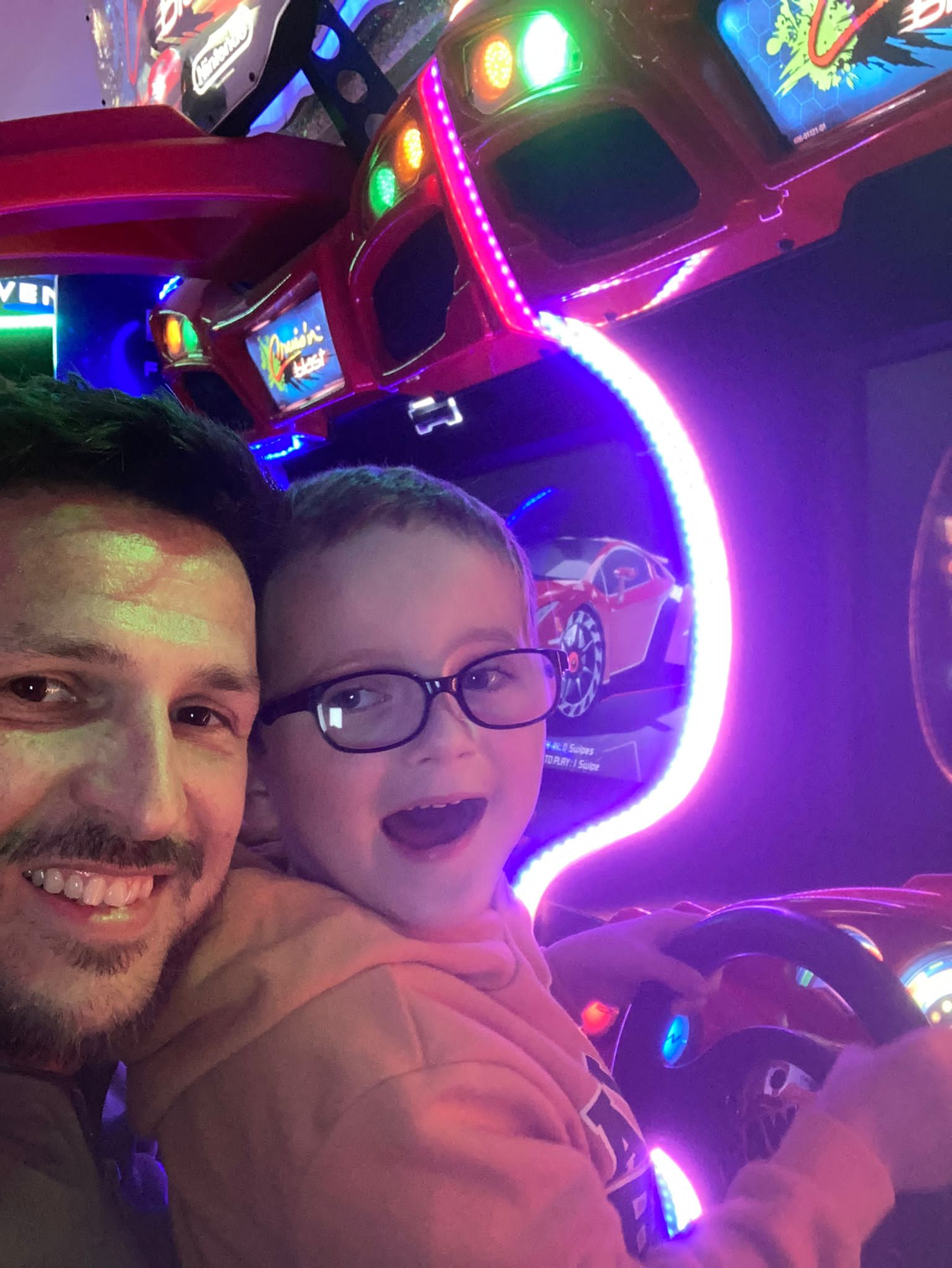 Because of Chester's diagnosis and cerebral palsy, he's been to a physio, who’s great. He's been going two or three times a week since he was five months old, which obviously comes at a cost. Initially, we thought, we’d probably need some support with this because it’s the best part of £100 for a one-hour session, and then we started to realise that we were also going to need other things, like wheelchairs, so Sam had the idea of setting up a fundraising page. It’s called ‘Cheers for Chester’ and it’s run via a charity called Just4Children, who basically enable you to fundraise and have your own pot of money. It also means that, from a credibility perspective, no one can ever accuse you of using the money for something else, because you can only actually spend it on something that they allow you to. So that's good when people see you going on trips or buying nice things – you shouldn't feel guilty about that if you're fundraising at the same time. We did some fundraising and got him his first wheelchair, with Captain America wheels, which he loves. Then we started having conversations with Bristol Hospital about a big operation called SDR surgery, which basically cuts all of the spastic nerves in his spine and would remove the scissoring in his legs. That would give him the only chance he'd ever have to be able to stand and walk with a frame. We went to appointment after appointment in Bristol. Everything was looking really positive and then all of a sudden, they sent us a letter saying they wouldn’t perform the operation. They have a classification system between one and five, with five being the most serious and one being the most mild. In this country, they only currently fund and operate on levels two and three, and Chester was classed as a four. Sam found the world's leading surgeon who pioneered the surgery, called Dr Park, who was based in St Louis, America. He said he could work on Chester, and people come from all around the world to this guy. We needed to fundraise £100,000 to make it happen, so we did events, ranging from golf days, to auctions and poker nights. The biggest event we did was a group run from Poole to Bristol over the course of three days. We ran three marathons in three days, which hurt like hell, but it was really emotive because we were doing these tens of thousands of steps to help Chester have just one step. It was such an incredible experience for everyone involved. We had some of the parents helping us with support vehicles, and we managed to get lots of sponsors. It was also great from a mental health perspective, because of the training involved, having a dual goal with other people, and getting time to run as well. Both myself and Sam felt great while we were doing the run because we had a purpose and a goal, and on top of that we were doing it as part of a team and actually getting healthier. We have really fond memories that we will cherish and it also enabled us to fundraise to get to St Louis.
Because of Chester's diagnosis and cerebral palsy, he's been to a physio, who’s great. He's been going two or three times a week since he was five months old, which obviously comes at a cost. Initially, we thought, we’d probably need some support with this because it’s the best part of £100 for a one-hour session, and then we started to realise that we were also going to need other things, like wheelchairs, so Sam had the idea of setting up a fundraising page. It’s called ‘Cheers for Chester’ and it’s run via a charity called Just4Children, who basically enable you to fundraise and have your own pot of money. It also means that, from a credibility perspective, no one can ever accuse you of using the money for something else, because you can only actually spend it on something that they allow you to. So that's good when people see you going on trips or buying nice things – you shouldn't feel guilty about that if you're fundraising at the same time. We did some fundraising and got him his first wheelchair, with Captain America wheels, which he loves. Then we started having conversations with Bristol Hospital about a big operation called SDR surgery, which basically cuts all of the spastic nerves in his spine and would remove the scissoring in his legs. That would give him the only chance he'd ever have to be able to stand and walk with a frame. We went to appointment after appointment in Bristol. Everything was looking really positive and then all of a sudden, they sent us a letter saying they wouldn’t perform the operation. They have a classification system between one and five, with five being the most serious and one being the most mild. In this country, they only currently fund and operate on levels two and three, and Chester was classed as a four. Sam found the world's leading surgeon who pioneered the surgery, called Dr Park, who was based in St Louis, America. He said he could work on Chester, and people come from all around the world to this guy. We needed to fundraise £100,000 to make it happen, so we did events, ranging from golf days, to auctions and poker nights. The biggest event we did was a group run from Poole to Bristol over the course of three days. We ran three marathons in three days, which hurt like hell, but it was really emotive because we were doing these tens of thousands of steps to help Chester have just one step. It was such an incredible experience for everyone involved. We had some of the parents helping us with support vehicles, and we managed to get lots of sponsors. It was also great from a mental health perspective, because of the training involved, having a dual goal with other people, and getting time to run as well. Both myself and Sam felt great while we were doing the run because we had a purpose and a goal, and on top of that we were doing it as part of a team and actually getting healthier. We have really fond memories that we will cherish and it also enabled us to fundraise to get to St Louis.
We’ve raised well over £100,000 and we've got a decent pot left, which is paying for Chester's ongoing therapy. Sam drives him to Oxford every single Wednesday for a two-hour session, he has two physios a week, horse-riding on Saturdays, racerunning on Sundays, physio work on a Monday, and we're also paying for external teaching support in school two days a week to help him learn to read. Chester goes to a special needs school, but because every child there is so different, it’s really hard for them to teach effectively. That's not me having a go at the school, it’s just that every child has complex learning needs. We’ve found Chester is mentally more able than some of his peers at the school, and we want him to be able to read and write. We believe that he's capable of learning more than he is, so we're using some of the fundraising to assist with that as well.
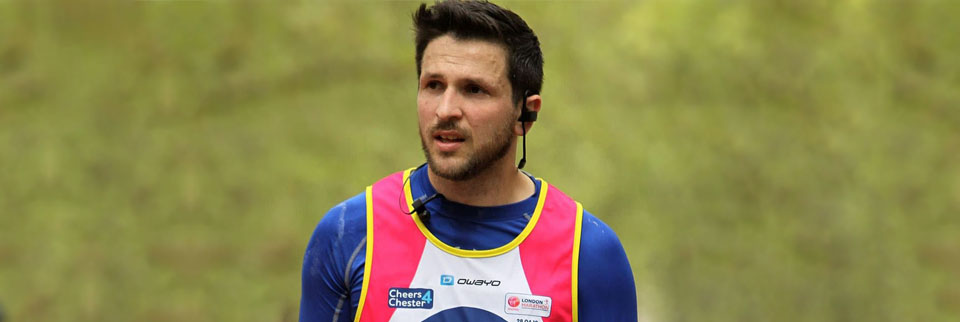
A really good piece of advice to give anyone going through a situation like mine is to have goals. If you've got something to focus on, it really does help. The purpose of our fundraising run was to get Chester to America, but just having something to focus on was really helpful. The operation itself was another thing to focus on, but because we were given a date during lockdown, we had to write to the US Embassy to plead to allow us in the country on a humanitarian basis. You don't know if you're going to get in; there’s no one you can phone, and you just get an answer via email seven days before you're supposed to leave. You can imagine the stress, waiting for this to come through. So, while we’d paid for flights and got everything else sorted, we didn’t know if we would even be allowed to go. When we arrived, we then had to isolate for 10 days because of covid regulations. When we got to St Louis there was deep snow, and we stayed in an Airbnb in the middle of quite a deprived area. St Louis is known as the murder capital of America, so it's not somewhere you want to go on holiday. Sam and I worked most of the time we were out there. My company was amazing with me, and even with the time difference, we managed to get through it. We would get up at 3am local time, log in, do some work and then get Chester up and to the hospital. Obviously, he was there for his operation but then there was physio every day. It was a really full-on six weeks in America, but I actually enjoyed working while I was out there. I enjoyed being up super early, and I enjoyed being in a different place.
One of the biggest challenges in our country is that each local authority does its own thing and has its own teams, and it’s been a real battle throughout. We had to go through a crazy amount of hoops to get him into the special needs school he's at now. We struggled to get him an EHCP, even though he's severely disabled, and then to get him his place in the school. And now, because he is mentally able, we want to get him into a dual school approach. We want him to have the care and expertise from a physical perspective, but also normal relationships and learning experiences in a mainstream environment. It's taken six months to even hear back, and now we're being told that the school is concerned they may not be able to meet his needs next year. So we're having to go back through that whole process again. It's just another thing that kind of knocks you back, but it's another challenge for another day. You want your child to have opportunities and experiences – friendships that are going to last a lifetime, and the potential to have jobs when they're older. School is a really difficult one to handle; not just the impact that it has when you don't always get the answers you want, but also knowing how to navigate it as well. No one tells you how to navigate each part of your child’s life, and schools are obviously a big part of that. So, you really have to be resilient. You really have to push down those barriers yourself a lot of the time, pick up the phone and make things happen. You need to speak to other parents who've been through similar experiences to ask them what they did, who their contacts were and who helped them out. That's the only way you can get through these situations. Sam and I would love to help other families who have similar challenges. One of the reasons I wanted to get involved with Eddy is because I'd be more than happy to share my experiences to help others.
Chester and I do lots of fun things together. He makes me laugh every day – he's a cheeky character. Sometimes, me and Sam will sit in the car and just look at each other, because you can almost sense the relief and happiness if he's happy that day and had a good day out. And that could be something simple like going to a toy shop – it doesn't need to be something grand like you've gone to a Peppa Pig World or something – it's the small things for Chester. I get the most enjoyment out of him when I see him laugh, and he's got the most infectious laugh. When he gets involved with stuff, that's when I'm super proud. During pass the parcel, if he sits in that circle, I get an enormous sense of pride. To see him interacting with other people, that's when I really get a sense of enjoyment out of it. It’s that interaction, and I'm witnessing him building relationships.
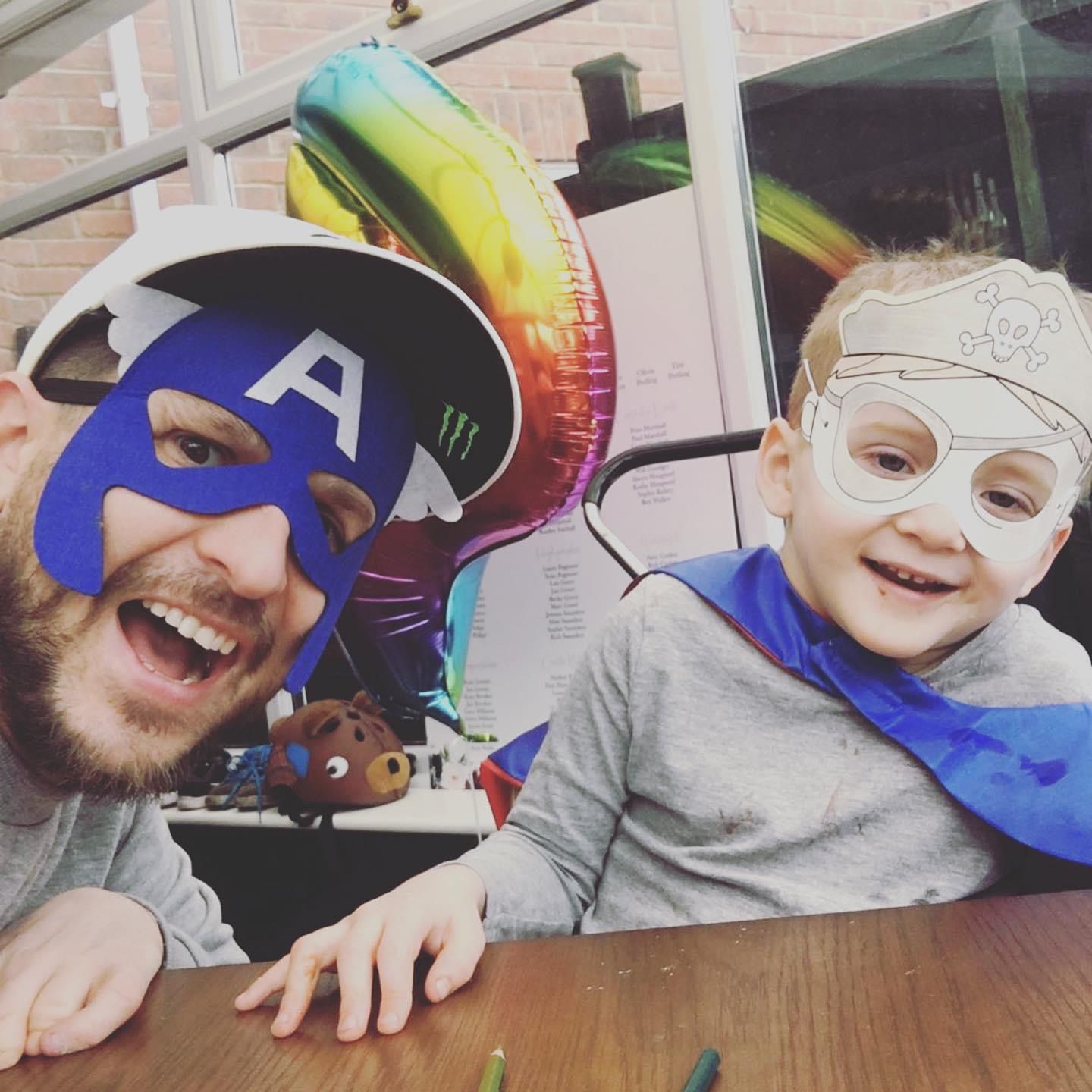 What's the best advice you were given when you started this journey?
What's the best advice you were given when you started this journey?
Actually, I’ve found general advice about different organisations useful, or people offering services or days out that can help us. Tangible things, as opposed to solid advice. For example, we were put in contact with the Dorset Children's Foundation, and they run various events that are all inclusive, so Chester gets to be around other children similar to him, and he’s getting involved. So, it's not necessarily advice that’s been useful, it's been more about ideas of things to do, because that's really difficult when you have a child with disability; you definitely don't want to be an island. If you don't embrace the fact that your child’s different and do different things, and instead try to bury your head in the sand and do the same as everyone else, you're going to really struggle. So, while you want to be as normal as possible, you do still have to accept the fact that your child is different, your world is different and your life is different. You have to take the plus points out of everything you can.
What advice would you give to other dads in a similar situation?
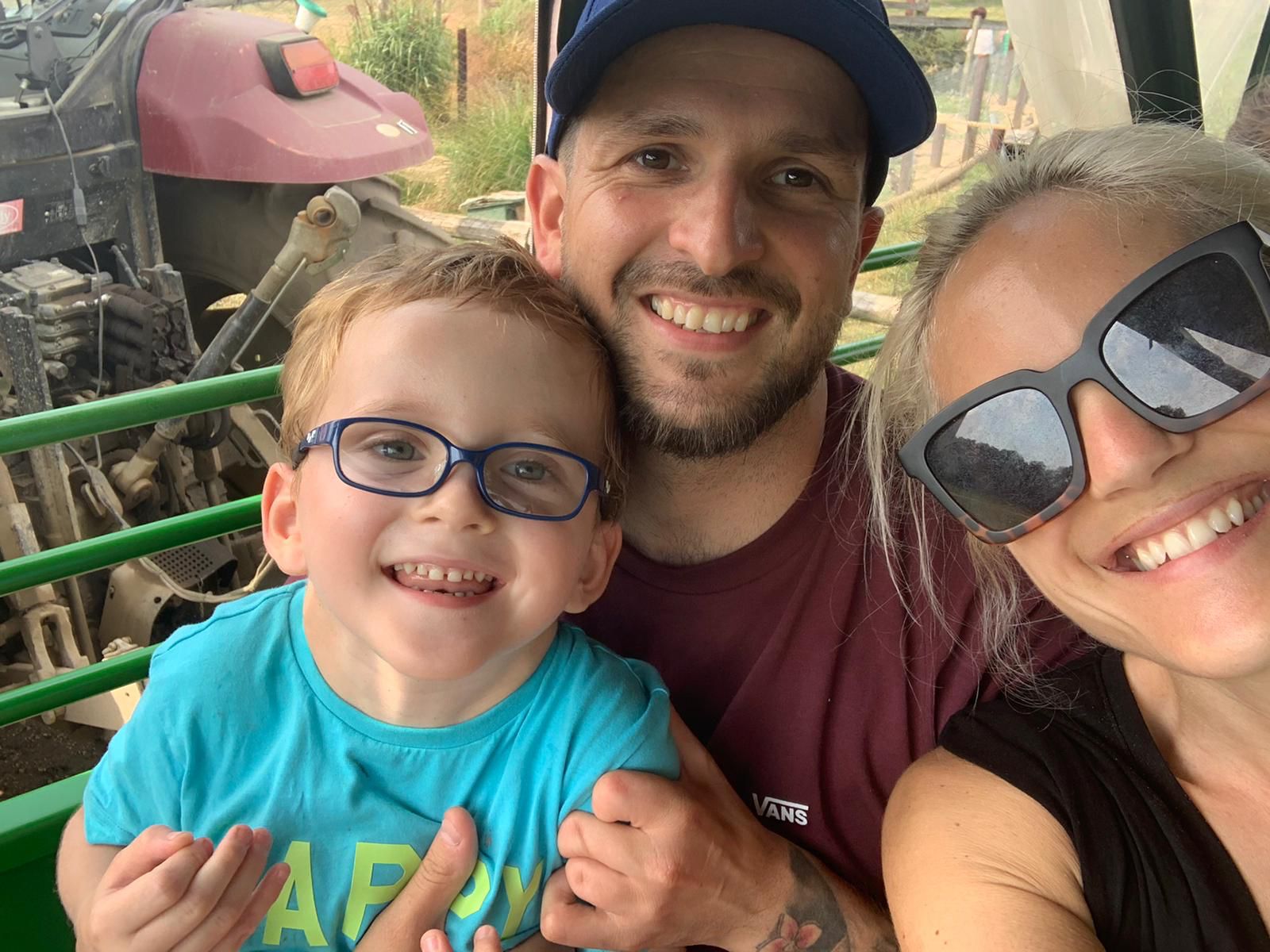 Be comfortable being different. Accept the cards that you've been dealt. Another really important one is to remember you can't have a blame culture, or it will eat you up. And really importantly, if you're married or have a partner, you've got to understand and recognise that they're also going to go through a really tough time, and they're going to see things in a different way to you and react in a different way. What you can't do is argue with how they feel, or try and rationalise it. They feel what they feel, the same as you do. Sometimes you've just got to accept that, rather than trying to help. Me and my wife fell out loads over the past few years, because I really annoyed her when she was having a down day and she didn't want to get out of bed, and I was saying ‘you need to pull yourself together and get out’, and actually, I've learned that's what she needed at that time.
Be comfortable being different. Accept the cards that you've been dealt. Another really important one is to remember you can't have a blame culture, or it will eat you up. And really importantly, if you're married or have a partner, you've got to understand and recognise that they're also going to go through a really tough time, and they're going to see things in a different way to you and react in a different way. What you can't do is argue with how they feel, or try and rationalise it. They feel what they feel, the same as you do. Sometimes you've just got to accept that, rather than trying to help. Me and my wife fell out loads over the past few years, because I really annoyed her when she was having a down day and she didn't want to get out of bed, and I was saying ‘you need to pull yourself together and get out’, and actually, I've learned that's what she needed at that time.
You do have to keep moving forward step by step. One thing I've realised is, every year, every six months, every stage, you get a different set of hurdles. You’ve got to work out how to overcome those, but make sure you take the plus points out of them as you do, as well as the learning. I think I am pretty resilient, to be fair I have to be. When you see your friends and other people, they don't necessarily understand your own specific situation. Even your closest friends, who will do whatever they can to support you, will not be able to fully empathise with you or understand your family situation. That's ok, and I think you just have to realise that, because then you’re not just being really jealous of other people. Because people will help, and we saw that with fundraising. The amount of support our friends gave us, and even some people we didn’t know, either financially or getting involved, was unbelievable. People do want to help. What they can't do is change their own world so that they completely empathise and understand, because they’ve got their own problems, which to them feel just as big as your problems. And you’ve just got to be totally comfortable with that.
Are there things you do now to help with your mental health and the way you approach the day?
One thing that I think is really important for anyone, is to have something for yourself. I try and encourage my wife to do this as well. Her thing is running. My thing, and I'm rubbish at it, is golf. So, I make sure that I try at least once a week, where I can, to go for golf. Because it's four hours out with your friends in the open, some fresh air, and you just kind of disappear from the realities for a bit. So, while it's not that I'm trying to bury my head in the sand or run from my situation, it’s something that I enjoy for me. And it also gives me something to look forward to as well.

